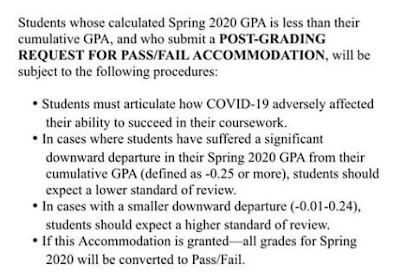For the past ten days, I was completely focused on just collecting policies and indexing them. I started with the blog post on March 18, but as the list kept growing I knew I needed something more powerful, and Diigo is working well. Eventually there will probably be thousands of these policies; I'm not going to attempt to index them all, but I can certainly keep going for a while. I'm learning a lot, so that makes it worthwhile for me, and I keep hoping that the available policies will be helpful for people advocating for policies on their campuses.
Policies that are kind.
Policies that are generous.
Policies that are flexible.
Policies that trust students.
Policies that respect students.
Unfortunately, though, some policies are just the opposite: they are not kind or generous or flexible. They reveal a lack of trust for students and a lack of respect for students.
And that's really depressing.
So, I'm going to write up some blog posts along the way based on what I'm learning. One thing I've learned: it's not the grades in individual classes that matter (sometimes they do; I'll say more about that in a later post). Instead, this is mostly about the GPA.
It's about protecting the GPA.
It's about making sure that schools can continue to use the GPA going forward, even if there are unexpected and even bizarre grade marks that will appear on students' transcripts for the Spring 2020 semester.
And for the most dramatic example of the cult of the GPA that I've seen so far, here's something from the Sandra Day O'Connor College of Law at Arizona State University. I first saw this at Twitter, and it's also at Above the Law.
(Side note: ASU as a whole does not have an alternate grading policy in place school wide. Just the opposite: they have strongly endorsed the value of continuing to grade without accommodations at their website, i.e. "Grades are important to students, employers, graduate schools and professional programs in medicine, law and other disciplines," etc.)
Anyway, here's how it works: ASU law school students who want to petition for P/F grading this term will be judged based on their previous GPA.
See About the Law for a detailed critique of the whole process (conclusion: "When life gives you lemons, ASU makes performative lessons about why people hate lawyers").
What I want to focus on here is the cult of the GPA, and how at ASU Law School your GPA itself will be turned against you in the process of requesting an accommodation to protect your GPA during this crisis. You will have to reveal who-knows-what kind of personal information to receive an accommodation, and that petition will be reviewed with more or less harshness based on your previous GPA. This will then provide greater leniency for those who had a higher GPA to begin with because, hey, they had farther to fall.
How depressing is that? This is the worst thing I have seen so far in looking at grading policies over the past ten days.
I've seen other bad things too.
But also some good things, and I'll definitely share something good in the next post to make up for this gloomy item.
Meanwhile, thanks so much to people who have been sharing news from their schools, and I hope the existing policy collection will help you advocate for something truly helpful to students at your schools!
